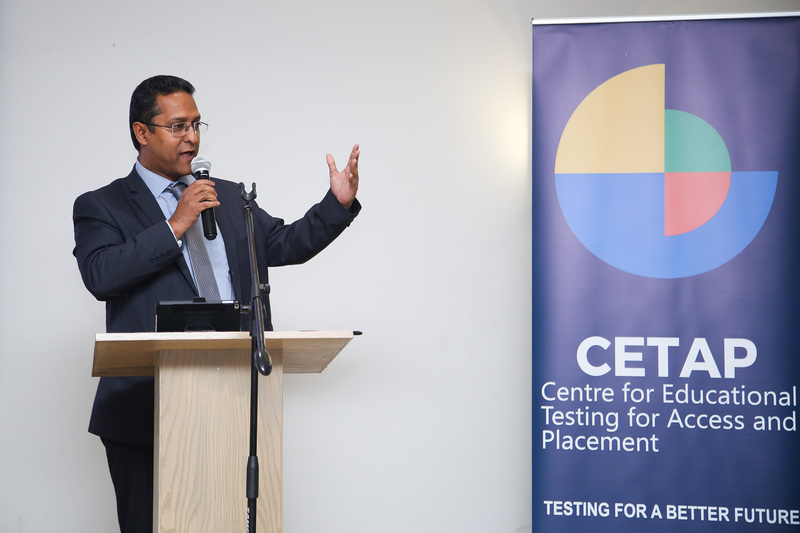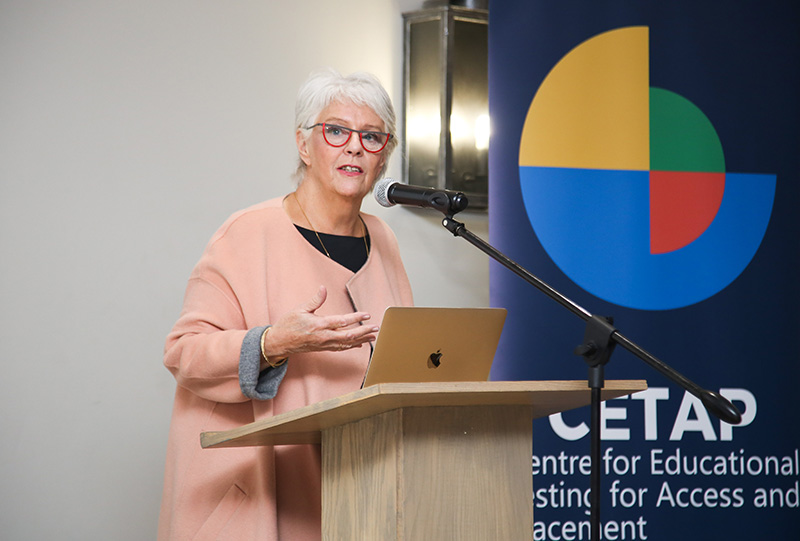CETAP celebrates 10 years of NBTs
03 September 2019 | Story Staff Writer. Photos Je’nine May. Read time 5 min.
It’s been ten years since Universities South Africa (USAF) first rolled out the National Benchmark Tests (NBTs) to assess the academic readiness of prospective first-year university students in the competency areas of academic literacy, quantitative literacy and mathematics. In that time, the relevance of the NBTs and the additional opportunities they offer for the higher education sector have been proven.
This was according to speakers and stakeholders at the anniversary celebrations held on 26 August by the University of Cape Town’s (UCT) Centre for Educational Testing for Access and Placement (CETAP).
CETAP, an independent unit in UCT’s Centre for Higher Education Development (CHED), is home to the National Benchmark Tests Project (NBTP), which administers the NBTs for the entire country. UCT was chosen to develop and administer the NBTs on behalf of USAF because of the existing expertise in what was then UCT’s Alternative Admissions Research Project – now CETAP.
In addition to members from the testing department, the celebration was attended by peers from Nelson Mandela University, Stellenbosch University, Sefako Makgatho Health Sciences University, Umalusi (Council for Quality Assurance in General and Further Education and Training), the Cyril Ramaphosa Foundation, the Educational Testing Service (USA) and the Tomorrow Trust.

A major undertaking
CHED’s acting dean, Associate Professor Alan Cliff, said the anniversary celebrated a major undertaking by CETAP on behalf of the higher education sector to be responsive to the learning needs of school-leavers seeking admission to tertiary study.
The purpose of the NBTs is to identify academic potential in any learners who have not had access to adequate schooling and to ensure appropriate learning support when they get to university.
“The development of standardised tests … enable the sector to identify gaps in school-leavers’ entry-level knowledge, skills and literacies and allow for the development of curricula that are sensitive to addressing these gaps across all programmes,” said Cliff.
He added that the tests and the analysis of results enable a nuanced understanding of the generic learning needs of students.
“This understanding can be used to develop learning support systems and teaching approaches in disciplinary contexts.”
Standardised assessment of this kind, said Cliff, complements results on the National Senior Certificate (NSC) examination – the other national assessment – and provides a snapshot analysis across the whole sector.
Value and validity
UCT registrar Royston Pillay, who delivered the introductory remarks at the celebration, commented on the relationship between NBTs and the NSC, emphasising that the NBTs were never intended to undermine or act in competition with the NSC examinations.
“There is a place for both, working in a complementary way,” said Pillay.
The registrar added that the NBTs offer the sector “massive diagnostic value and benefit” and will continue to be relevant for admissions decision-making purposes. They also enable a “calibration of an admissions system” in a way that allows for “legally defensible decisions” where, for instance, one high-achieving school leaver is offered a place above another high-achieving school leaver.
CETAP director Naziema Jappie added that the use of the NBT data validates the diagnostic value of the NBTs, and there is a compelling case for the NBTs to be used across the post-secondary school sector.
“The NBT has proven to be a good predictor of success when used in a complementary way with the NSC,” she said.

Echoing these sentiments was Professor Chrissie Boughey, the former Deputy Vice-Chancellor: Academic and Student Affairs at Rhodes University. She delivered the keynote address at the celebrations.
She described how, over time, there has been a lot of talk about alternative testing in South Africa and admitted that people have questioned the validity of the NBTs. Boughey said that arguments about NBTs could now be put to rest thanks, in part, to large-scale research funded by the Michael and Susan Dell Foundation.
“The validity of the NBTs has been established,” said Boughey. “What we now know … is the NBTs have predictive validity at least as good as the NSC.”
Also, added Boughey, the NBTs can provide information that the NSC cannot, such as insight for curriculum development. According to the former DVC, NBTs provide an in-depth look into what students can and can’t do.
“Significant opportunities present themselves … We have significant opportunities for change.”
 This work is licensed under a Creative Commons Attribution-NoDerivatives 4.0 International License.
This work is licensed under a Creative Commons Attribution-NoDerivatives 4.0 International License.
Please view the republishing articles page for more information.










